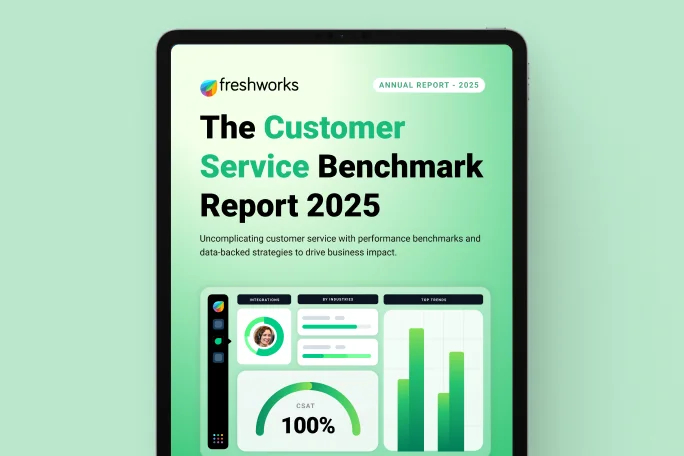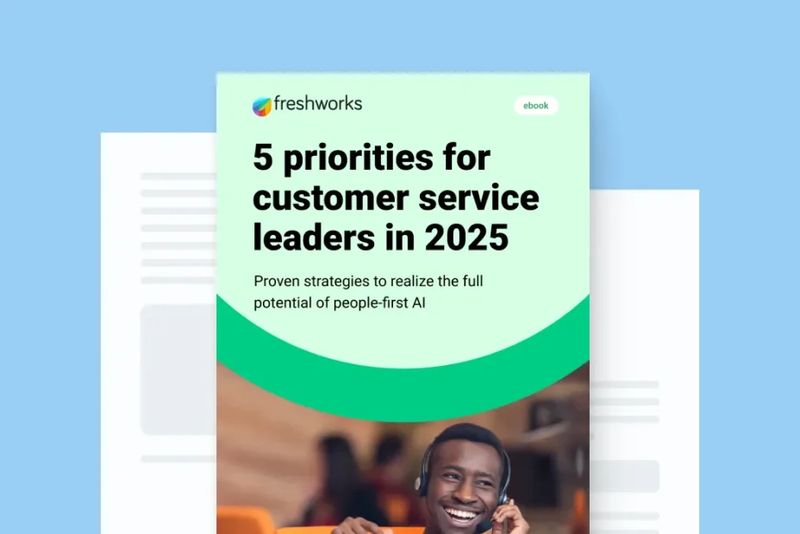The agentic AI solution for modern customer service
With Freshdesk, AI agents and human agents work as one—resolving every issue, instantly and intelligently.
Seamless support. Smarter agents. Faster resolutions.
Unify every channel, cut the noise, and give agents an easy-to-use platform to resolve requests without missing a beat. With Freshdesk, you don’t just keep up, you stay ahead.Answer email queries with Email AI agents that read every incoming email ticket, understand the request, respond with the right solution, and auto-resolve the ticket when it helps. No triage, no manual replies, just faster outcomes at scale for your teams.
Meet Freddy AI
From AI agents that resolve routine queries instantly to AI-powered assistance for human agents, Freddy AI combines automation and intelligence to help your team work more efficiently, scale effortlessly, and deliver great experiences across every channel.
Learn moreIndustry-leading results with Freshdesk
The full customer service experience
Everything you need to support customers and empower teams—all in one place, available out of the boxConnect seamlessly across chat and voice
Add chat, social, and voice to your email support and manage every customer conversation in one place. Respond faster across channels and shorten wait times. With all your channels together, your agents stay efficient and customers get seamless, always-on support.
Learn moreHelp your customers find answers
With a branded help center, customers can browse articles, explore FAQs, raise tickets, and join community conversations.
Learn moreOne view of your customer
View every customer interaction, ticket, and contact detail in one place. No switching tabs or searching for customer data.
Learn moreRoute and assign tickets
Automate ticket routing, assignment, and prioritization based on agent skills, workload, and based on customer sentiment.
Learn moreTurn data into better decisions
Track key metrics like CSAT, response times, and ticket trends. Spot bottlenecks, monitor team performance, and turn insights into action.
Learn moreConnect your business apps
Integrate with the tools your team relies on, all natively built into Freshdesk. Get started without extra costs or complexity.
Explore integrationsJoin 73,000+ companies uncomplicating customer service
View all customer storiesI want the ability to get one view of how we support our customers—not just the number of tickets, but any information on how we interact with them. You've got to bring everything into one platform. Freshworks allows us to do that.
The experts agree
Recognized by G2 and TrustRadius for delivering modern, AI-powered customer service that drives results.
Explore insights & resources on AI-powered customer service

2025 Customer Service Report
Evaluate your performance against industry competitors to see how you measure up.
Forrester on the TEI of Freshworks
See the Total Economic ImpactTM of ticketing and conversational support in one with Freshworks.
5 priorities for CX leaders in 2025
With customer expectations in flux, learn what CX leaders are doubling down on in 2025 to lead the way.Get started with Freshdesk
Free to try. Fast to scale.
Experience the power of Freshdesk with a free trial. No credit card needed. Set up in minutes and see immediate value.
See rapid impact in action
Let our product experts show you how Freshdesk can solve your specific challenges. Get a personalized walkthrough tailored to your needs.
Learn, explore, get inspired
Check out the interactive product tour to explore Freshdesk’s capabilities.